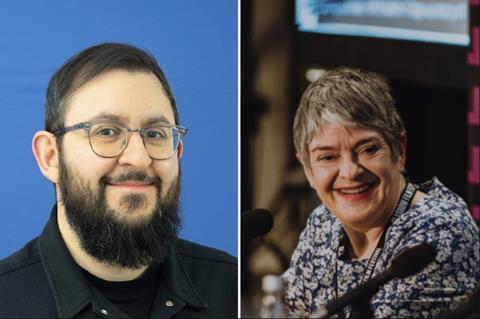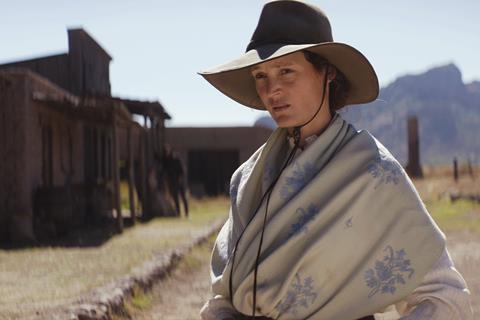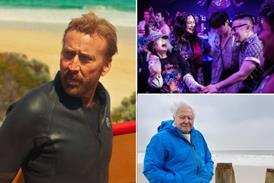
“Releasing the films out in the world is, for me, the most intense part,” reflects Glasgow Film Festival (GFF) director Allison Gardner, on the eve of the festival’s 20th anniversary edition.
GFF opens tonight (February 28) with the UK premiere of Rose Glass’s Sundance and Berlinale title Love Lies Bleeding, and runs until March 10.
John Archer’s documentary Janey, about Scottish comedian Janey Godley as she embarks on her final tour following a terminal cancer diagnosis, will close the festival. Further anticipated titles including the world premiere of UK filmmaker Lucy Cohen’s Edge Of Summer; Ciaran Lyons’ debut feature, Tummy Monster; the UK premiere of Emma Westenberg’s Bleeding Love starring father-daughter duo Ewan McGregor and Clara McGregor; and the UK premiere of Viggo Mortensen’s The Dead Don’t Hurt, with Mortensen in attendance.

Across the programme, including retrospectives and special seasons, 43% of films are from first or second-time directors.
”What we have been championing [with audiences] for the past 20 years is – take a chance on something you don’t know,” says Gardner. ”That’s the best way to experience a festival.”
The industry programme features a live animation project pitching session with a £5,000 funding prize, as well as discussions featuring BFI Filmmaking Fund director Mia Bays and BBC Film director Eva Yates, plus execs from HanWay Films and Signature Entertainment, alongside Scottish film talent Girl director Adura Onashile, production outfit barry crerar and Ken Loach’s screenwriting collaborator, Paul Laverty.
The free retrospective programme is returning with 10 titles from Glasgow Film’s history – including Wuthering Heights from 1939 and The Godfather: Part II from 1974. 2024 is the 50th anniversary of the Glasgow Film Theatre (opened as the Cosmo in 1939), the cinema that is the GFF hub, which Gardner also runs.
This is the first edition of Glasgow Film Festival without Gardner’s right-hand man Allan Hunter, who stepped down as co-director after last year’s festival. Gardner is steering the ship with a rising team of programmers led by co-ordinator Chris Kumar.
Screen spoke to Gardner and Kumar about about the importance of bringing in a new proramming team, balancing budgets, and working with Edinburgh International Film Festival.
Feature submissions increased threefold this year to 400. Why do you think this is?
Chris Kumar: I’d like to think, last year especially, the programme was so strong, and we’re at the point now that we’re getting filmmakers returning to the festival and talking to each other.
Allison Gardner: Word-of-mouth from filmmakers is good. But also, they have a great time when they’re here. We’re looking after the film, we’re looking after them. It’s a great launchpad – there are lots of films at [BFI] London Film Festival and this is no disrespect to London as we work quite closely with them, but there is a lot going on in terms of high-profile films in a way we don’t have at Glasgow. Things get lost and don’t get the pizzazz the film needs.
What role do the retrospectives play in the line-up?
AG: I’m very keen that we offer audiences a chance to see film history, where films don’t always use the same language we would now. I’ll use an example from last year – Lee Grant’s documentary [What Sex Am I?] that she made in the 1980s. The language used in that film isn’t language we would use now, but it was a very important piece of work. You can’t dismiss things because they don’t use the language of now – you have to give audiences the context, treat them as an adult. We should give people those opportunities with content notices. It doesn’t make everything bad. I’m not a fan of [cancel culture]. We should give people the opportunity to hold respectful, kind discussion. We shouldn’t be polarised. Grey areas are where the magic happens.
Tell us about your new programming team of rising talents.
AG: There are only a few people who can move between the higher end festivals. There aren’t a lot of opportunities for younger people to get in, and a lot of people can’t get in because at some festivals the jobs are unpaid. Very few people can do that. You want to create a place where everybody, no matter their background, can access those opportunities.
What is the funding model this year?
AG: It’s at the same levels as previous years. The ideal model for festivals like ours is a third [of the budget from] public funding, a third earned income and a third sponsorship or philanthropy. That’s quite difficult, but it’s a good model so you aren’t relying on any one source. The earned income is doing well, but we still have the same amount of money that we’ve had from Screen Scotland since 2015.
The BFI has supported us more, they really like what we do. Ben Luxford and the audience team is really supportive, and Mia Bays is very supportive, she’s coming up to the festival.
But there’s not a lot of cash sloshing around anywhere for anyone, so we have to be realistic. We are a living wage employer, we have no unpaid internships, everyone is paid, so staff costs are higher. We haven’t massively increased our ticket prices, we’ve only just increased them from 2019 by 60p. What we need to do is budget carefully, and get the best value for money. My job in balancing the budget is challenging, and I work a lot with our industry team, who are doing an excellent job. We are a lean, mean, running machine. There is not an ounce of fat.
Your Scottish cousin, Edinburgh International Film Festival, has had a tough few years. How much do you collaborate with incoming festival director Paul Ridd?
AG: I know Paul very well, I’ve offered him support. As for many years before, before it went all wrong, I’m very keen for us to work collaboratively and have a great way of working that gives good value for public money. Our industry programme this year is very strong, we’ve got lots of ticket sales for that. I don’t think they’ll [Edinburgh] have an industry programme back to levels they had previously for many years, those things take time. Paul [Ridd] is coming over to GFF.
CK: We’re all in it together at the end of the day – we all want to work together and make the whole landscape better.


































No comments yet